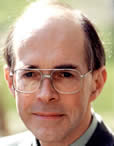Saint Mark, violence, and the discipline of reading— A sermon by Oliver O’Donovan (O’Donovan, 2008)
They went out and fled from the tomb, for terror and amazement had seized them, and they said nothing to anyone, for they were afraid. (Mark 16:8)
This is the last, and most extraordinary, of the silences of Saint Mark’s Gospel, which is a book full of silences. “See that you say nothing to anyone!” So Jesus warned the leper he had healed; and when he cured the deaf-mute he told all who were present to tell nobody. It was the same for those who saw Jairus’ daughter raised from the dead; and the blind man of Bethsaida was sent home with his sight restored, but not allowed so much as a courtesy call in the village he had begged in, in case he talked. Jesus silenced the demons who said they knew who he was. Only Legion was instructed to speak. He silenced Simon Peter when he said “You are the Christ, the Son of the living God”; and finally, most strikingly, he was silent himself, when Caiaphas and Pilate tried to interrogate him.


